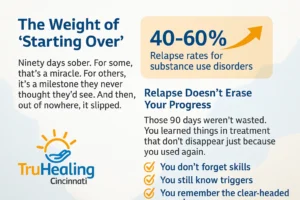The Weight of “Starting Over”
Ninety days sober. For some, that’s a miracle. For others, it’s a milestone they never thought they’d see. You did it—you counted the days, collected the chips, maybe even told your family you were finally free. And then, out of nowhere, it slipped.
Relapse doesn’t always come as a crash. Sometimes it sneaks in as a whisper: “Just one night.” “Just this once.” “You deserve a break.” But one night becomes a weekend, and the weekend becomes a slide you didn’t see coming.
Now you’re sitting in the aftermath, flooded with shame, guilt, and fear. You wonder: If I couldn’t stay sober after 90 days, what makes me think I can do it again?
That’s a brutal question—but it’s also a lie. Relapse doesn’t erase what you built. It doesn’t erase your worth. And most importantly, it doesn’t erase your chance to heal. Opioid addiction treatment in Cincinnati is still here, waiting for you to step back in.
Relapse Doesn’t Erase Your Progress
One of the cruelest things about relapse is how it convinces you that you’re back at square one. But the truth is: you’re not.
Those 90 days weren’t wasted. You learned things in treatment—skills, triggers, insights—that don’t disappear just because you used again. You still know the breathing techniques. You still recognize the cravings for what they are. You still remember the mornings you woke up clear-headed and proud.
Think of relapse like falling off a bike. You don’t forget how to ride. Your muscles remember. Your body remembers. You just need a hand to steady yourself as you climb back on.
Shame Is Heavy—But It’s Not the Truth
Shame can feel like a weight strapped to your chest. It says:
- You failed.
- You disappointed everyone.
- You don’t deserve another chance.
But shame is not the truth. The truth is that relapse happens for many people. The National Institute on Drug Abuse estimates that relapse rates for substance use disorders are similar to those of other chronic illnesses like diabetes or hypertension—about 40–60%. That doesn’t mean treatment failed. It means recovery is a long road, one that requires adjustments and persistence.
Shame says, “Don’t go back.”
Hope says, “You can always return.”
And at TruHealing Cincinnati, staff don’t look at alumni who relapse as failures. They see you as someone who is still alive, still willing to fight, and still capable of change.
Why Coming Back Feels Different
When you come back after relapse, it’s not the same as your first time. You’re carrying new self-awareness. You know what worked and what didn’t. Maybe you realized that avoiding certain triggers wasn’t enough. Maybe you discovered that stress at work hits harder than you expected. Maybe you underestimated the loneliness that came when the excitement of early sobriety wore off.
This time, you’re bringing all of that knowledge with you. Treatment after relapse isn’t about starting from scratch—it’s about strengthening the cracks you discovered along the way. That’s the gift hidden inside relapse: it shows you where healing needs to go deeper.
If you’re not in Cincinnati, don’t forget that support stretches outward. For example, if you’re looking for opioid addiction treatment in Lexington, Kentucky, TruHealing also offers resources nearby. You’re never as far away from help as shame tries to convince you.

Stories That Prove You’re Not Alone
In every alumni community, there are stories of relapse. People who left after 30 days and came back stronger at 60. People who relapsed three times before making it to their first sober year—and now have five years clean.
One man described relapse as the moment he realized recovery wasn’t a sprint. He said, “I thought I could outrun addiction. But I had to learn how to walk with it—slow, steady, one step at a time.”
Another woman said her relapse taught her humility. “I used to think I was above it all. That I was stronger than the cravings. Relapse showed me that strength isn’t about never falling—it’s about getting up, again and again.”
These stories aren’t about failure. They’re about resilience. They’re about proving that recovery doesn’t require perfection. It requires persistence.
Practical Ways to Re-Engage After Relapse
Relapse can leave you frozen, unsure of your next move. But healing begins the moment you take one step back toward connection. Here are some gentle ways to start:
- Call one safe person. You don’t need to explain the whole story. A simple “I need help” is enough.
- Reach out to your treatment center. Staff understand relapse and will guide you into the right level of care without judgment.
- Ease back in. Commit to one group, one appointment, one meeting. Tiny steps create momentum.
- Bring what worked before. Remember the tools, rituals, and supports that carried you through those 90 days. Bring them back into play.
- Be radically honest. Speak openly about your relapse in group or with your counselor. Honesty kills shame and allows others to support you fully.
The Local Support Waiting for You
Cincinnati is home to programs and people who understand relapse, including TruHealing. Walking back into treatment doesn’t mean you failed—it means you’re still choosing life. And that choice matters more than the slip that brought you here.
If you live in surrounding areas, you still have access to care. For instance, if you’re looking for opioid addiction treatment in Louisville, Kentucky, you’ll find nearby programs ready to welcome you back. Whether it’s Cincinnati, Lawrenceburg, or Lexington, support is within reach.
FAQs About Relapse and Returning to Treatment
1. Does relapse mean treatment didn’t work?
No. Relapse is part of recovery for many people. Just like other chronic illnesses, it may take multiple adjustments to treatment before long-term stability sets in.
2. Will people in treatment judge me for relapsing?
Most people in recovery know what relapse feels like. You’ll likely be met with compassion, not judgment. At TruHealing, relapse is seen as an opportunity to grow, not a reason to shame you.
3. Am I starting from zero again?
Not at all. You’re bringing all your knowledge, experience, and skills from your last treatment stay. You’re not erasing progress—you’re building on it.
4. How do I explain relapse to my family?
You don’t need to justify your relapse. Instead, share your willingness to try again. Families may struggle at first, but seeing you return to treatment can rebuild trust over time.
5. How do I stop feeling ashamed?
Shame thrives in silence. Talking openly—with peers, counselors, or alumni—helps dissolve it. Remember: relapse is not who you are. It’s something that happened.
6. Can relapse actually make me stronger?
Yes. Many people discover that relapse highlights areas they didn’t realize needed work—stress management, loneliness, or overconfidence. Addressing those areas often leads to deeper, more sustainable recovery.
A Final Word of Hope
Relapse after 90 days may feel like the end of the road. But it’s not. It’s a bend, not a stop sign. You don’t lose your progress, your worth, or your future because of one stumble.
You’re still here. You’re still breathing. You still have another chance. And another after that. Recovery doesn’t demand perfection—it asks for persistence.
Take the Next Step Today
You don’t have to wonder if you’re allowed to try again. You are. The support you need is already waiting.
Call (888) 643-9118 or Opioid Addiction Treatment program in Cincinnati, Ohio to learn more about the hope and healing still available to you.


